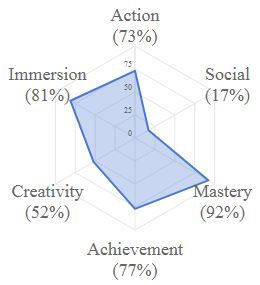Video games has been a long-standing constant in my life. Every phase of my life can be easily tied to a video game that defined it. But what makes constantly save and load games day in and day out? Quantic Foundry has a 5-minute survey that can determine your gaming motivation. Perfect. Here’s what I’ve got:
Your Gamer Motivation Profile :
Action-Oriented, Proficient, Deeply Immersed, and Practical

Scoring high on Mastery indicates interest in challenging and complex games requiring deep strategic thought. A core part of the gaming experience is failing, so failing in-game just means the game is doing it’s job. Mastery gamers are persistent. Improving strategy or gameplay is how we progress and appreciate the game. Essentially, games need to be cleverer than the gamer for it to be enjoyable. People who play Dark Souls know what I mean.
Immersion can be understood as the desire for a captivating narrative, deep characters, and fascinating environments in a game. This can be two pronged–a focus on storylines and character development or a focus on embodying “someone else, somewhere else.” Immersion gamers can overlook shoddy mechanics (and maybe even graphics) if the narrative is gripping enough. The Assassin’s Creed series is full of glitches and bad mechanics, but I’ve played every console title since its release in 2007. The storyline can be absurd at times but it’s still a fun time.
Gamers driven to level-up and find all the collectibles score high in Achievement. These are your 100%-ers and grinders. Completing in-game achievements, getting legendary weapons or maxing stats is top priority. A cohesive plot to these gamers is superfluous to the mechanics of a game. I’ve never 100%-ed a game, but I will make sure I play every relevant mission before I beat the last boss. WoW players and Final Fantasy fans have this in common.
Every video game has a bit of action–defined here as destruction or excitement. Destruction is exactly what it is–blowing things up and causing mayhem. Excitement is measured on a different axis of fast-paced and intense. Action games don’t need to be aggressive or violent either. A game about being a slice of bread looking for a toaster while trying to stay fresh can be just as exciting as driving a tank in downtown LA while being pursued by the National Guard.
Video games are inherently creative–it is a expression that can feel extremely intimate as a player. Aside from art aesthetics and graphics, players can express their own Creativity in games by how they play it. Creative gameplay gives players freedom to make decisions on what to do or discover in a game. Games that give the ability to highly customize characters in look or behavior (or both) give the player agency to create an experience that is special and unique. The Sims and Zelda: Breath of the Wild expand on players’ in-game creativity quite well.
The Social component of video games has been heavily developed on in the past decade. The rising popularity of streaming and eSports makes the case of how important sociability is to the video game industry. Players can be social by collaborating with other players towards a common goal or players can work against one another trying to be the top player. Games like Destiny, WoW, and even fighting games like Street Fighter and Super Smash Brothers have a social experience tied to it.
Here’s where I give my take: I scored low on Social because being a girl playing online is a crappy experience. At best, you’ll encounter white knights who think they know best and will try to steamroll you for your own good. At worst, players will literally threaten your safety. I haven’t experienced anything that made me feel unsafe or nauseous and that is by design. I refuse to talk in team-chat solely because I won’t allow toxic players to ruin my game.
Its a tough reality of enjoying video games–knowing you often aren’t seen as an equal teammate or competitor simply because you are a girl. Though as of late, gaming is becoming very mainstream. You don’t get the same reaction you did 10 years ago when you told someone spend 5 hours last night leveling up. But if Gamergate showed us anything, it’s that the negative attitude towards “girl gamers” by their male-counterparts is alive and kicking.
Otherwise, I think this is a fair estimation of my motivation.My Creativity score is pretty low, but an honest self-reflection tell me that although I have enjoyed creative games in the past (Roller Coaster Tycoon, The Sims) I don’t play them much anymore. At this age, the lack of a plot and payoff in those games just feels like a waste of time. I need to know that I’ll be rewarded at the end of a level after spending all that time I could have spent getting my real life organized.
My high scores in Mastery and Immersion are spot on. Complex gameplay with great stories and characters is what I look for in game. For me, video games are an extension of a piece of media, where you have the agency to live your best life in-game. Video games give us worlds in which we we would never find ourselves and makes us determine our own personal experience within it.
Quantic Foundry even gives recommended games. Mine are:
- Bloodborne
- XCOM 2
- Middle-earth: Shadow of Mordor
- The Last of Us
- XCOM: Enemy Unknown
- Darkest Dungeon
- BioShock Infinite
- Crusader Kings II
- Dark Souls III
- Persona 5
Definitely going to try to play Persona 5, XCOM 2, and Nioh (in lieu of Bloodborne) in the next couple of months.
The Gaming Motivation Profile is a great tool to understand yourself as a gamer. Now that I can pinpoint what I love about games, I can stop wasting my time and money with games like Overwatch.